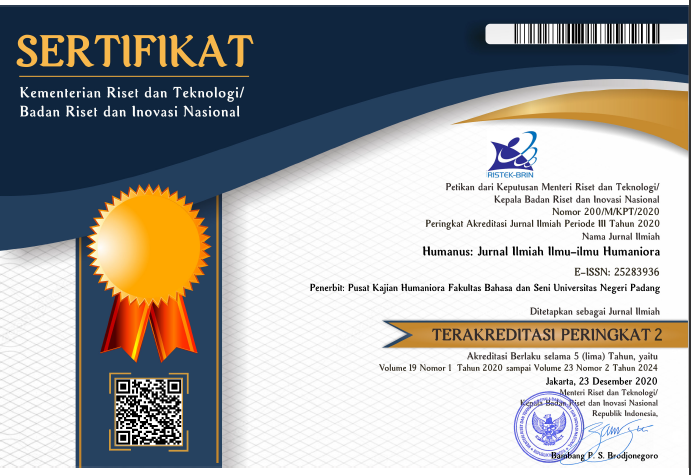BE PROUD OF INDONESIAN CULTURAL HERITAGE RICHNESS AND BE ALERT OF ITS PRESERVATION EFFORTS IN THE GLOBAL WORLD
 ), Ririn Ovilia(2),
), Ririn Ovilia(2), (1) Universitas Negeri Malang
(2) Universitas Negeri Malang
 Corresponding Author
Corresponding Author
Copyright (c) 2017 Humanus
DOI : https://doi.org/10.24036/jh.v15i2.6428
Full Text:
 Language : en
Language : en
Abstract
BANGGA DENGAN KEKAYAAN WARISAN BUDAYA INDONESIA DAN WASPADA DENGAN USAHA PELESTARIANNYA DI DUNIA GLOBAL
Abstract
Indonesia as an archipelago country has a lot of cultural heritage that it is decently called as a multicultural country. The richness of Indonesian culture is not only in tangible cultural heritage but also in intangible one. It includes artifacts, inscriptions, traditional food, clothes, music instruments, oral traditions and expressions, performing arts, rituals and festive events, knowledge and practices concerning nature and the universe, and traditional craftsmanship. However, there have been a number of issues concerning the sustainability of Indonesian cultural heritage. Some of which are the difficulty of connecting culture with societies, the struggle to maintain inter-generational transfer of knowledge, lack of recognition, stylistic and thematic imitation, misappropriation by unauthorized reproduction or distribution, and foreign claims to Indonesian cultural heritage. Those issues are influenced by the globalization era in which the development of life style and technology increases rapidly. Due to the crucial value of the culture as the identity of a nation, therefore Indonesia surely needs to preserve it. This paper aims to discuss the richness of Indonesian culture, several cultural issues in global world, and the cultural heritage preservation efforts. The significance of this paper is to give a better understanding about these issues and to create awareness about the importance of maintaining cultural identity of the nation in global world.
Keywords: Indonesian cultural heritage; preservation efforts; global world
Abstract
Indonesia sebagai negara kepulauan memiliki banyak warisan budaya yang biasa dikenal sebagai negara multikultural. Kekayaan budaya Indonesia tidak hanya dalam warisan benda budaya tetapi juga dalam bentuk tak benda. Ini termasuk artefak, prasasti, makanan tradisional, pakaian, alat musik, tradisi dan ekspresi lisan, seni pertunjukan, ritual dan festival, pengetahuan dan praktek mengenai alam dan semesta, dan kriya tradisional. Namun, ada sejumlah isu mengenai keberlanjutan warisan budaya Indonesia. Beberapa di antaranya adalah kesulitan menghubungkan budaya dengan masyarakat, perjuangan untuk mempertahankan transfer pengetahun antar-generasi, kurangnya pengakuan, peniruan gaya dan tematik, penyalahgunaan reproduksi dan distribusi oleh pihak yang tidak sah, dan klaim asing untuk warisan budaya Indonesia. Isu-isu tersebut dipengaruhi oleh era globalisasi ketika perkembangan gaya hidup dan teknologi meningkat pesat. Mengingat pentingnya nilai budaya sebagai identitas suatu bangsa, bangsa Indonesia tentu perlu untuk melestarikannya. Tulisan ini bertujuan untuk membahas kekayaan budaya Indonesia, beberapa isu budaya di dunia global, dan upaya pelestarian warisan budaya. Signifikansi dari makalah ini adalah untuk memberikan pemahaman yang lebih baik tentang masalah ini dan untuk menciptakan kesadaran tentang pentingnya menjaga identitas budaya bangsa di dunia global.
Keywords: warisan budaya Indonesia; usaha pelestraian; dunia global
Keywords
References
Arobba, B, Robert E.M., Joe F. & Alan B.C. 2010. A Community-Based Social Media Approach for Preserving Endangered Language and Culture. Retrieved from http://www. ideals.illinois.edu in November, 12th 2015.
ASEAN Economic Community Blueprint. 2008. Jakarta: ASEAN Secretariat.
Brown, D. & Lee H. 2015. Teaching by Principles. New York: Pearson Education, Inc.
Copsey, N. & Rowe C. 2011. The Preservation and Enhancement of Cultural Heritage in Mediterranean. Birmingham: European Union.
Davidson. G & Conville Mc. 1991. A Heritage Handbook. St. Leonard, NSW.
Hasibuan, Z.A., Yugo, K.I., Baginda, A.N.C., Mubarik, A. & Nungki S. 2011. Preservation of Cultural Heritage and Natural History through Game Based Learning. International Journal of Machine Learning and Computing,1(5), 460—465.
Irina, R. & Andrei, R. 2012. The Role of Festival and Cultural Events in Strategic Development of Cities. Informatika Ekonomika,16(4), 19—28.
Jaszi, Peter I. 2009. Traditional Culture: A Step Forward for Protection in Indonesia - A Research Report. Jakarta, Indonesia: Institute for Press and Development Studies.
Mahmoed, M.M.A. 2015. Culture and English Language Teaching in the Arab World. Adult Learning,26(2), 66—72.
Robbins, C. 2010. Beyond Preservation: New Direction for Technological Innovation through Intangible Cultural Heritage. International Journal of Education and Development Using Information and Communication Technology,6(2), 115—118.
Spenser, H. 2012. What is Culture? Retrieved from http://go.warwick.ac.uk/globalpad intercultural in November, 11th 2015.
Storey, J. 2009. Cultural Theory and Popular Culture (fifth edition). London: Pearson Longman.
UNESCO Institute. 2009. UNESCO Framework for Cultural Statistic. Canada.
UNESCO. Intangible Cultural Heritage Domains.
Vesajoki, F. 2002. The Effects of Globalization on Culture. Thesis. Jyväskylä: university of Jyväskylä.
 Article Metrics
Article Metrics
 Abstract Views : 7140 times
Abstract Views : 7140 times
 PDF Downloaded : 1328 times
PDF Downloaded : 1328 times
Refbacks
- There are currently no refbacks.
Copyright (c) 2017 Humanus

This work is licensed under a Creative Commons Attribution-NonCommercial 4.0 International License.










